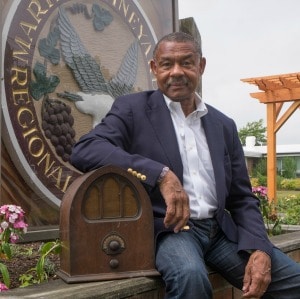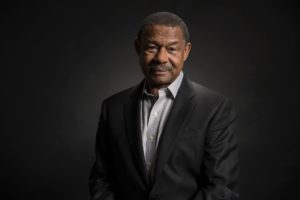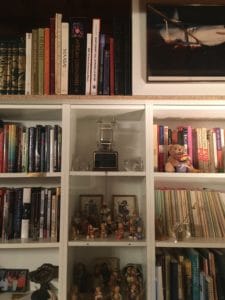
Skip Finley: 1994 Broadcaster Of The Year
In 2017, not only is Radio Ink celebrating its 25th birthday, our Radio Wayne Awards also turn 25. The Radio Wayne Awards were started in 1992, the same year The Pulse of Radio became Radio Ink. Chairman Eric Rhoads named the awards after “Radio Wayne” Cornils, and they recognize outstanding performance in radio leadership, management, and sales. In 1994, Skip Finley won the Radio Wayne for Broadcaster of the Year.
Radio Ink: Back in 1994, when you won the Radio Wayne, what were you doing at the time?
Finley: In 1994 I was one of the principal owners of WKYS-FM in Washington, DC; my partners were the late Bertram M. Lee, the late Ron Brown (former U.S. secretary of commerce), Jim Kelly (former husband of Sharon Pratt Kelly, mayor of Washington, DC), and Michael B. Elefante, an attorney and partner at Hemenway & Barnes. We enjoyed a time when it was meaningful to be the number one-ranked station in audience and revenue, and at an Urban-programmed station in a major market.
Radio Ink: What was it like managing radio stations in 1994 compared to what you hear when you talk to friends today?
Finley: This was prior to deregulation, when your focus was on one versus several stations; your complete goal was winning with one station, not maintaining the sales and ratings of a group of otherwise average stations and generating share-of-market revenue through discounting rates as a strategy. We didn’t have eight stations, and if we had two or three, we had two or three managers whose focus was branded on the success of those operating entities. It seems today we focus on the winner and the one or two “losers,” relegating those in the middle to being average. Average never wins, average is never monetized, average is its own definition and a place professionals don’t populate.
 Radio Ink: What would you say to managers all across the country about being successful today?
Radio Ink: What would you say to managers all across the country about being successful today?
Finley: Just like the Stephen Stills song: “And if you can’t be with the one you love, honey, love the one you’re with.” A) Don’t take it all so seriously. B) Overachieve in all areas of your involvement — public service, promotion, people. C) Plan your work, work your plan, repeat. Rule 1: Make money. Rule 2: Have fun. Rule 3: See Rule 1.
Radio Ink: What would you say to everyone in radio who wants to advance to the level of success you had in our business?
Finley: Learn your craft and its history. If you do not know the first words ever spoken on the radio, the person who does will beat you in the ratings. If you don’t comprehend the salient differences between AM and FM, the person producing a better website will beat you. If you cannot discern the value and use of a mobile app, you better hope your dad owns your station. We were hungry, active, and energetic. We understood that the station with the least ratings generated 100 percent of revenue without them. We knew that engaged audiences created sales where the rubber met the road, not PPM.
Radio Ink: Did you ever imagine when you first entered the radio business that you would be as successful as you became?
Finley: No, I never imagined the success I was lucky enough to experience, and I had too much fun along the way to take it seriously. In retrospect, I was responsible for over 45 stations in 17 U.S. markets and close to a half-billion dollars in transactions of station purchases and sales. Surprisingly, I happen to be black — and that’s a cool thing, unfortunately a unique one — but not affirmative action. I’m proud to have studied and learned a craft I continue to love and enjoy.
Radio Ink: Did you achieve every goal you wanted to in radio?
Finley: No, I didn’t achieve all that I may have wanted — a billion sounds better than a half billion — but my worst days in radio were among the best of my life.
Radio Ink: How important is aggressively educating yourself if you want to climb the radio ladder?
Finley: It’s not easy to be the smartest person in the room in an ostensibly
C-student business. But it doesn’t hurt. The smartest person went out of their way to learn the business. You should, too — otherwise you won’t recognize the smartest person in the room. Learn something, earn something, and if you get the chance, teach someone else.
Radio Ink: What did winning that Radio Wayne mean to you?
Finley: I had no idea I was up for the Radio Wayne Award — Wayne was a friend and associate — and I had to be found. I was wandering around the conference, gripping and grinning, when Ron Ruth went and found me and dragged me into the ballroom. I still wasn’t understanding what was happening when Eric Rhoads handed it to me, and, seeing the tears in my eyes, he was gracious enough to cover for me in a moment of speechlessness. I’ve had a lot of moments in my 45-some years in the business, but that was the zenith. I recall Eric laughing when I recognized the award was made from an AM final tube.
Radio Ink: Do you know where that award is today?
Finley: What does it mean to me? Its spot on my bookshelf is covered in glass. It has never had even a speck of dust on it in 25 years.
Skip Finley tells us he has retired from radio five times. Today he’s a writer, penning a weekly town column for the Vineyard Gazette in Oak Bluffs, MA, where he spent his summers growing up, and he has a “day job” as the director of sales and marketing. Recently, thanks to Mike Carter at the Carter Broadcast Group and consultant Tony Gray, Finley built a low-power FM station at a local high school that they are using to teach students radio. (The format is reggae; www.wyob.org.) Finley says he’s been pretty lucky in life and career, and that teaching kids is his contribution to the business. He recently completed a book on black whaling captains.
You can reach Skip via e-mail at [email protected]






Classic & Heritage broadcaster. Set the tone early on for aggressive and passionate embracing of the medium. Gave back. Great read Skip. ?